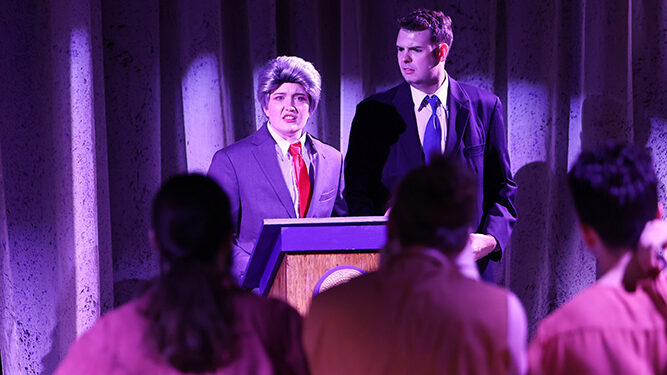Play devised by students, teacher explores technology, society
Professor leads third-year students in developing their own production

caption
Emily McInnis and Liam Oko perform as Bill Clinton and Al Gore in Artificial Oddity at the David Mack Murray Studio on Feb. 10.
A play written and performed by Dal theatre students in early February dealt with the evolving effects of technology on society, said their professor.
Artificial Oddity, which was performed at David Mack Murray Studio from Feb. 6-10, was created by a third-year acting class at the Fountain School of Performing Arts.
The play is a devised piece, meaning the students and teachers worked together, without a script, to create a brand-new piece of theatre.
“Devised productions are really special because it includes more creation for students and it encourages them to bring their own voice to a project in many different ways,” said Matthew Walker, an assistant acting professor in the Fountain School of Performing Arts and the play’s director.
Walker starts the devised production process by giving students an entry point. The entry point this year was society’s fear of technology across time. Students then signed up to debate one of six historical technologies while acting as a historical figure or creating a fictional character.
“So many inventive ideas, perspectives, and arguments came out of that, that we were able to use that as a baseline for building a script with a coherent storyline,” said Walker.
One key storyline from the play focuses on the Greek myth of Prometheus, a god who stole fire from the other gods and gave it to humans. This idea was presented and reflected on the centre stage throughout the devised production, by student actor Baily Nash.
“I debated Prometheus at the start of creating Artificial Oddity, because I was so interested in bringing a new perspective to such a famous story,” said Nash.
“I wanted to add more emotion to the myths that we know about Prometheus. So, I focused more heavily on his love for humanity, which the myths don’t really talk about.”
The scenes and characters the students created may be familiar to the audience, but not necessarily what they expect. Characters range from famous faces like Bill Clinton and Al Gore to Karl Marx and Henry Ford.
“By using these famous historical figures, it really allows the audience to assess and reflect on how we’ve grown with technology over time,” said Walker.
In a world navigating artificial intelligence, Artificial Oddity aims to look back in time to similar groundbreaking technological advances to see how they might affect current society.
“I just hope people look at the history represented in our play and feel inspired to work together to not let technology rule our lives,” said Nash. “I want to inspire people to work with technology, not against it.”
About the author

Marielle Godfrey
Marielle is a fourth-year journalism student at the University of King's College. She enjoys beach days, reading, and her golden retriever, Angus.
